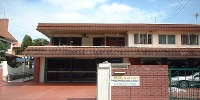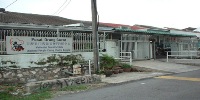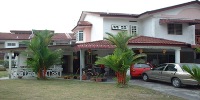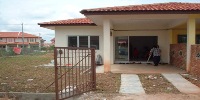By THO XIN YIFOR Bathmavathi Krishnan, being disabled does not stop her from participating in sports.
A former athlete in school, her world was shattered when she met with an accident 32 years ago. She then lost the ability to walk.
 Gutsy: Malaysian Interfaith Network coordinator Dr John Gurusamy presenting the trophy and cash prize to Bathmavathi.
Gutsy: Malaysian Interfaith Network coordinator Dr John Gurusamy presenting the trophy and cash prize to Bathmavathi.
But a ray of hope appeared when wheelchair tennis was introduced in the early 80s and she saw the possibility of taking part in sports again.
“Besides keeping myself fit, sports gives me a sense of satisfaction and self-worth,” said the 53-year-old retiree.
Bathmavathi was among some 120 disabled people who participated in the Mini Sports For the Disabled 2007 at SJK (C) Puay Chai recently.
She bagged the first runner up trophy in wheelchair ping-pong (women's category).
The event, organised by Beautiful Gate Foundation For the Disabled and Malaysian Confederation of the Disabled, was aimed at providing an opportunity for the disabled from different races and backgrounds to interact and build friendships.
“It is also a way to boost the disabled people's confidence while challenging them physically and mentally through sports,” said Beautiful Gate Foundation executive director Pastor Sia Siew Chin.
Damansara Utama assemblyman Datuk Lim Choon Kin who was present at the prize giving ceremony said: “Although the disabled are physically handicapped, their ability to perform is sometimes better than the able-bodied.”
“This sports event is an encouragement to the disabled and also an eye-opener for the able,'' he added.
A total of four events – wheelchair ping-pong, wheelchair badminton, chess and lawn bowling – were held in the mini sports.
It was sponsored by SS2 food court, Pizza Hut, England Optical Group and Suan Huat Auto Corporation Sdn Bhd.
Source : http://thestar.com.my/metro/story.asp?file=/2007/7/14/central/18250697&sec=central
挑战大马眼哗声四起(吉隆坡14日讯)逾百名来自卫理公会的年轻男女,在清新的早晨齐聚蒂蒂旺沙花园,陪同美门的残障人士共同挑战“大马眼”,克服他们的心理障碍让他们融入人群。
这项由卫理公会中部教区及雪兰莪教区青年团协办,卫理公会华人年议会青年团及美门残障关怀基金联办的“MY CARE挑战大马眼”活动,让残障朋友们实实在在地感受平常人所进行的活动。
马来西亚基督卫理公会华人年议会会友领袖黄敬映则认为,要彻底解决国家经常忽略残障人士的问题,年轻一代必须担起重任,在这方面作出好榜样,才能为这个社会带来好的风气。
公众纷纷伸出援手
来自美门残障关怀基金会的残障人士,今早顺利登上大马眼摩天轮时,皆露出又惊又喜的表情,数名畏高的残障朋友也勇敢踏出第一步,享受普通人的乐趣之余,也增广见识。为了让不良于行的朋友顺利坐上“大马眼”的座位内,在场的人士纷纷伸出援手,合力把他们抬上专属位子,现场顿时形成温馨的画面。
其中1名失明人士向媒体表示,虽然本身无法像其他美门会员一样,在高空遥望美丽无际的景色;可是听着同伴们兴奋及赞叹的解释,也让她深感处于高空的美丽,弥补了双眼看不见的缺憾。
这项为时半小时的“MY CARE挑战大马眼”活动,在下午1点结束后,美门残障关怀基金会将继续前往下一个旅游景点。
另一方面,直辖区政务次长姚长禄认为无论在任何地点,当局都应该为残疾人士设想,建立一些特别措施更是不可或缺。
他指出,吉隆坡市政府早在前2个月已经向他提出,如何在吉隆坡发展中建立照顾特别人士的设施,让他们能够毫无忧虑地进行活动。
他说:“倘若政府在未来的日子,把大马眼计划落实成为永久性旅游景点的话,那么我们将会探讨如何兼顾残疾人士的计划。”他今早为“MY CARE挑战大马眼”活动开幕时透露。
 “MY CARE挑战大马眼”活动在周六早晨举行。
“MY CARE挑战大马眼”活动在周六早晨举行。
 大马眼的工作人员帮忙把以轮椅代步的人士,慢慢推上座位。
大马眼的工作人员帮忙把以轮椅代步的人士,慢慢推上座位。
摘自:光华日报.Kwong Wah
Ping Pong and Badmintion Competition
乒乓与羽毛球赛All this while I have heard about disabled mini sports held by Beautiful Gate in the past, but never ever see it myself. I am unable to imagine how a disabled people can involve in ping pong or badminton until I have seen it today.
我常常听到美门以前举办过残障迷你运动会,却没有亲眼目睹,也无法想象残障朋友如何参加运动项目。直到今天,我亲眼目睹他们参加乒乓与羽毛球赛,才感到心服口服。
Chinese and International Chess Competition
中国象棋与国际象棋比赛
May be you can imagine how a disabled people playing chess, but not sure if you can imagine how a blind people can play chess? In the chess competition, there are quite some blind chess players, they used their great memory and hand to move the chess.
残障朋友参加象棋比赛可能你还可以想象得到,却不知道你是否也可以想象一下盲人下棋?在这里,有很多盲人棋手,他们靠的是惊人的记忆力,和用手触摸象棋而决定棋步。
Every move is a new move
世事如棋局局新
Every move is a new move, there are a lot of turning point in our life, we will experience different moment each time, thus we shall not give up when we are facing difficulties, however, we shall expect a more glorious future.
所谓世事如棋局局新,人的一生有许多转捩点,每一次都有不一样的遭遇,所以不应该为生活的不如意而一蹶不振;反之,应该期待更美好的未来。
Seven Years Old Boy
七岁的小男孩
Two months ago, I just got to know Wei Zhang, he was a shy boy and only smile at me while I talked to him. Later, I knew he reached the age to go to primary school, but his parent did not send him due to his disability.
两个月前,我初识的伟章是个害羞的小男孩,他并不多话,只会用傻笑来和我对话。后来才知道,伟章已经到了进小学的年龄,可是他父母没有送他上学。
Today, I met Wei Zhang again, he can speaks very fluent mandarin and become talkactive. I taught him how to use digital camera, he was very exciting and asked me to bring him around to take pictures. I can see that his learning curve has not been distort by his cerebral palsy, but better than the normal children.
今天再见到的伟章,却是口齿伶俐,讲得一口流利的华语。我教他怎样用数码相机,他就兴奋地要我带他到处拍照。由此可见,他的学习能力并没有因为他得了脑性麻痹症而受阻,反而比一般的儿童还要好。
Photos taken by Wei Zhang
伟章拍的照片
These are pictures taken by Wei Zhang. You can see the quality of the photos are not too bad.
这些都是伟章拍的照片,你可以看到这些照片还蛮不错的。
UNIVERSITI Malaya Bachelor of Science student Amy Wong Jia Hui did not start out doing volunteer work because of some dramatic experience or driving passion. She did it simply because she was appointed Social Concerns head in her university's Christian Fellowship society.
The society decided to adopt the non-profit Beautiful Gate Foundation for the Disabled as an organisation to help and support.
 Amy helping Beautiful Gate resident Siew Yin who suffers from ‘spina bifida’. – AZLINA ABDULLAH / The Star
Amy helping Beautiful Gate resident Siew Yin who suffers from ‘spina bifida’. – AZLINA ABDULLAH / The Star
Twice a year, she would take groups of students to visit the residents and help out in their charity efforts by selling old books in the SS2 market, or participate in their camps during the semester break.
“It used to be a duty as I was voted into the post,” muses Amy. “These days, I visit them whenever I'm free, I hang out with them when they call me out to go yum cha (get a drink).”
She mostly helps out at the Beautiful Gate Career Development Centre for the Disabled, where residents undergo training such as computer and English courses and are encouraged to find jobs and be independent.
A student volunteer for a year now, she has heard many stories from her disabled friends.
“I met one woman who was able-bodied until she was in her early 20s,” she recalls. “When she became pregnant, the doctor told her that she had a genetic problem and had to either abort the baby or have something go very wrong with her nerves.
“She chose to give birth to the baby.
“The baby is fine but she can't walk now and has to use a wheelchair.”
It is stories like these that keep her motivated and change her outlook on life.
“They are so energetic and determined to live,” she says in earnest. “I used to get depressed over exam results but now, I realise that there is more to life, a purpose in living.”
Being around the disabled has taught her many things. For instance, she never knew how difficult it was to manoeuvre a wheelchair till she had to participate in a game involving wheelchairs in a Be An Angel camp, designed to engage the disabled with the able-bodied and to teach the latter how to assist the former.
“It was tough for me. My hands were in pain,” says Amy. “But I now understand how they feel.”
Being able-bodied, Amy, 23, admits it is sometimes easy to take things for granted; she has become so familiar with the Beautiful Gate residents that she treats them like her able-bodied friends.
“I learnt that I should be sensitive with my words,” she explains. “I once tried to put a pair of socks onto my friend's feet and I said: 'Why don't you straighten your legs so it would be easier for me to do this?'
“She immediately scolded her legs, saying: 'Yeah, come on! Why don't you straighten?'
 Student volunteers find out how difficult it is to manoeuvre a wheelchair at the ‘Be an Angel’ camp.
Student volunteers find out how difficult it is to manoeuvre a wheelchair at the ‘Be an Angel’ camp.
“I realised how rude I had been and felt horrible after that.”
At the end of the day, Amy realises that what most disabled people want is genuine friendship.
“Being a volunteer is not so much about helping them but just being their friend.”
She has now become like family to the Beautiful Gate residents, chatting casually and being teased mercilessly by the office staff.
“Amy comes and disturbs us!” jokes the centre's staff member Chong Kar Yee, herself a cerebral palsy sufferer. “But people like her are rare. She can bond well with people of different ages and gender.”
Unfortunately, Amy still finds that many are not interested in doing what she does and some even think that Beautiful Gate, which is dependant mostly on public donations, is rich.
“At a flea market where I was holding out donation boxes, people told me that everyone gave to Beautiful Gate, so they should have lots of money,” she says.
The Centre's coordinator Ng Chung Chiat, who has worked there for eight years, believes that awareness about disability issues in general is poor.
“We write to schools and colleges twice a year proposing talks or student visits to create awareness,” he says. “Only about five schools in the Klang Valley respond in a year.”
Source : http://thestar.com.my/education/story.asp?file=/2007/6/24/education/18086667
Story and photo by CHRISTINA TANSEVEN years ago, college student Thee Wan Chiee was hit by a motorbike when she was on her way home after supper with friends.
She suffered a broken skull and lost her vision as well as her sense of smell permanently.
After the accident which occurred at Jalan Banting-Klang on May 14, 2000, Thee, then 19, was unable to see and was forced to quit her studies at a college in Nilai, Negeri Sembilan.
 Still thankful: Thee working at a computer with software specially designed for the blind.
Still thankful: Thee working at a computer with software specially designed for the blind.
“I couldn’t believe this had happened to me I was extremely frightened and confused to see only darkness when I opened my eyes,” said Thee, who is 26 now.
The first year after the accident was a tumultuous year for her.
She had to fight for her life following major surgery to repair her broken skull. She was in a coma for five days and hospitalised for a month.
She was also fighting with herself for a new lease of life.
“I can’t remember much about what happened that night except that there was lots of blood,”. Thee said, adding that she had very few memories of the whole episode.
“I took me some time to recognise my parents and two younger sisters, and to realise what had actually happened to me,” she said when met the Beautiful Gate centre for the disabled.
During the first month of her recovery, Thee said, she not only tried very hard to recall her memories, but also learnt to walk, like a toddler.
“It was several months before I could walk again, and a year before I was able to face the reality,” she said, adding that she was initially angry with God for what had happened to her and confined herself to her own room.
Thee said it was her mother’s grief and tears for her almost every night since the accident that pushed her to seek a new life.
“She has suffered so much for me and the only way to cheer her up – and those who care for me – is for me to be happy,” she said.
She walked out of her room and took up a one-year “beginner's course” at the School for the Blind in Brickfields, Kuala Lumpur, to learn some basic skills for daily living.
Although the tragedy had changed her life completely, Thee said, she had more friends than ever now.
Her old friends, ex-school mates and relatives, with whom she had lost contact for a long time, had called her and visited her in hospital and at home after reading about the accident in the newspapers.
Her relationship with her family had also become closer than before, she said, adding that her life was more complete and more independent now.
“So I have not lost much, actually,” she quipped.
In January, Thee started work as an accounts clerk at the Beautiful Gate disabled centre in Port Klang. She is grateful for the job opportunity and trust shown in her.
Lately, Thee said, she could see some colours. “This is probably due to the hope and happiness in me,” she said, adding that she had never given up hope that she would be able to see again.
“I’m waiting for an opportunity to return to college to further my studies and become a business-woman someday,” she added.
She hopes all motorists would be more careful and considerate because their actions could affect not only their own lives but also those of others.
“Not every one is as lucky as I am to be given a second chance to live,” she said.
Source : http://thestar.com.my/metro/story.asp?file=/2007/6/5/central/17859583&sec=central
 Gutsy: Malaysian Interfaith Network coordinator Dr John Gurusamy presenting the trophy and cash prize to Bathmavathi.
Gutsy: Malaysian Interfaith Network coordinator Dr John Gurusamy presenting the trophy and cash prize to Bathmavathi.

















